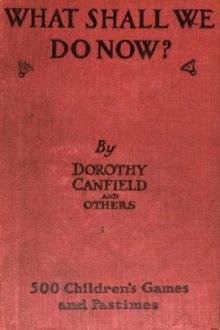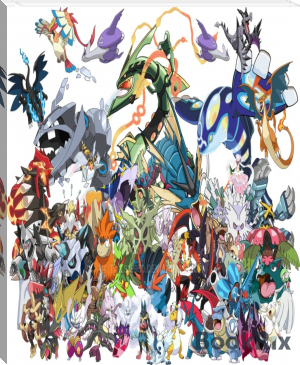What Shall We Do Now? - Dorothy Canfield Fisher (scary books to read .TXT) 📗

- Author: Dorothy Canfield Fisher
- Performer: -
Book online «What Shall We Do Now? - Dorothy Canfield Fisher (scary books to read .TXT) 📗». Author Dorothy Canfield Fisher
The players sit in a long row, as if in a class at school. The one that acts as schoolmaster asks sharply, beginning at one end, "The name of the letter?" "A," says the player. The schoolmaster turns to the next player, "the name of the ship?" and straightway begins to count ten very quickly and sternly. "Andromeda," is perhaps rapped out before he reaches that number. "The name of the captain?" "Alfred." "The name of the cargo?" "Armor." "The port she comes from?" "Amsterdam." "The place she is bound for?" "Antananarivo." "The next letter?" "B," and so on. If the schoolmaster is very strict and abrupt with his questions and counting, he can drive every idea from the mind of the person he points at. If he counts ten before an answer comes, he passes on to the next, and the next, and the next, until the answer is given. The one who gives it moves up above those that failed. The game should be played rapidly.
A variation on this is "When my ship comes in." This is played with a handkerchief knotted into a ball. Any letter of the alphabet is chosen; say B. One player throws the handkerchief to another, crying out, "When my ship comes in it will be laden with ——." The player who catches the handkerchief must supply a cargo, beginning with B before ten is counted, bees, butterflies, belts, etc. If he fails to do this he gives a forfeit. When one letter is exhausted another is chosen and the game starts over.
I Love My LoveThis is not played now as once it was. In the old way the players sat in a line and went steadily through the alphabet, each one taking a letter in order. This was the form:—"I love my love with an A, because he is [a favorable adjective beginning with A]. I hate him with an A because he is [an unfavorable adjective beginning with A]. He took me to the sign of the [an inn sign beginning with A], and treated me to [two eatables or an eatable and drinkable beginning with A]. His name is [a man's name beginning with A], and he comes from [a town or country beginning with A]." Then B, and so on.
A and B might run thus:—
I love my love with an A because he is adorable. I hate him with an A because he is apish. He took me to the sign of the Alderman and treated me to arrowroot and ale. His name is Arnold, and he comes from Ayrshire.
I love my love with a B because he is brisk. I hate him with a B because he is bookish. He took me to the sign of the Beetle and treated me to biscuits and bovril. His name is Brian, and he comes from Boston.
There is no reason why men should always be chosen. For the sake of variety the love may as well have a woman's name and a woman's qualities. In that case the inn might perhaps go and some such sentence as this take its place:—
I love my love with an A because she is amiable. I hate her with an A because she is awesome. We went to Uncle Alexander's, and had apricots and Apollinaris. Her name is Audrey, and she comes from Annapolis.
As finding seven words beginning with one letter is rather a heavy task for each player, the words might be taken in turn, as in the case of the "Ship" game mentioned above.
For a shorter way of playing "I Love my Love" the following form is used:—"I love my love with an A because he—or she—is [favorable adjective]. I will send him—or her—to [some place] and feed him—or her—on [something to eat]. I will give him—or her—an [some article, the use for which must be mentioned after it], and a bunch of [some flower] for a nosegay." Thus:—
I love my love with an A because he is artistic. I will send him to Australia, and feed him on asparagus. I will give him an alpenstock to climb with, and a bunch of asters for a nosegay.
My ThoughtThe players sit in a row or circle, and one, having thought of something—of any description whatever—asks them in turn, "What is my thought like?" Not having the faintest idea what the thought is they reply at random. One may say, "Like a dog"; another, "Like a saucepan"; a third, "Like a wet day"; a fourth, "Like a comic opera." After collecting all the answers the player announces what the thought was, and then goes along the row again calling upon the players to explain why it is like the thing named by them. The merit of the game lies in these explanations. Thus, perhaps the thing thought of was a concertina. The first player, asked to show why a concertina is like a dog, may reply, "Because when it is squeezed it howls." The next may say, "It is like a heavy saucepan because it is held in both hands." The third, "It is like a wet day because one soon has enough of it"; and the fourth, "It is like a comic opera because it is full of tunes."
P's and Q'sAnother old game of this kind is "P's and Q's." The players sit in a circle and one stands up and asks them each a question in turn. The question takes this form, "The King of England [or France, or Germany, or Africa, or Russia, or India, whatever country it may be] has gone forth with all his men. Tell me where he has gone, but mind your P's and Q's." The player who is addressed must then reply, naming, in whatever country is mentioned, some town that does not begin with P or Q or with any letter before P in the alphabet. Thus, if the question refers to England, he may say "Salisbury" but not "Bristol," "Redruth" but not "Oxford"; or to France, "Toulon" but not "Lyons," "Versailles" but not "Dieppe."
The game is capable of improvement or, at least, of variety. For instance, instead of P's and Q's, the questioner may say, "Mind your K's and L's," or instead of ruling out all letters before P, all letters after Q may be stopped. And one need not confine the game to geography, but may adapt it to include animals, or eatables, or books.
The ElementsThe players sit in a circle, and the game is begun by one of them throwing a rolled-up handkerchief to another and at the same time calling out the name of one of the four elements—air, water, earth, or fire. If "Air" is called, the player to whom the handkerchief is thrown must at once mention some creature that flies. Having done so she throws the handkerchief to some one else, calling perhaps "Earth," whereupon that player must mention an animal that inhabits the earth. And so on. The same animal must not be mentioned twice, and when "Fire" is called, the player to whom the handkerchief is thrown must keep silence until she throws it on again. Sometimes each player, after throwing the handkerchief and calling the element, counts ten as the limit of time in which the answer must be given. If it is longer in coming, or if something is mentioned which has been mentioned before, then a forfeit follows.
SuggestionsThis is a game which people either dislike or like very much. The players sit round the fire or table, and one of them begins by naming an article of any kind whatever, such as watering-pot. The word "watering-pot" will immediately suggest something to the next player—say "gardener." He therefore says "gardener." The next is perhaps reminded by the word "gardener" of a bunch of violets she saw the gardener carrying that morning, and she therefore says "violets"; the next at once recollects finding violets when she was in the country last spring, and she therefore says "Vermont." Thus the game goes on for, say, ten rounds, by which time, as we have seen already, the minds of the players have been carried miles away from the original watering-pot which set them at work. It is now necessary to trace the series of suggestions back to watering-pot again. This is done by the last player mentioning, not the last thing that he thought of, but the thing which suggested that to him. (Thus, the player next him may have said, in the last round, "an apple-core," which may have suggested to him "Tom Sawyer." He would not, however, when the task of retracing begins, say "Tom Sawyer," because to repeat your own words is too easy, but "an apple-core" and the next player, going backward, in his turn would repeat the word which suggested "an apple-core" to him.) The second part of the game, retracing the suggestions, is naturally more difficult than the first.
In this game two things are very important. One is, that silence should be maintained; the other, that the word you give should be suggested to you only by the previous player's remark. Also it is more fun to be quite honest about it, and really say what was first suggested, instead of making a choice.
Quotation GamesThis is a game which requires some poetical knowledge. The players sit in a circle and one begins by repeating a line of poetry. The next caps it by repeating whatever line comes next to it in the poem from which it is taken. The poem may either be continued or the game may deal only in couplets or four-lined stanzas. In another quotation game the first player repeats a line of poetry and the next follows it with another line of poetry which begins with the last letter of the previous quotation. Thus, if the first player says—
That sailed the wintry sea,
the next might cap it with—
and the next with—
Two Rhyming Games
Rhyming games require more taxing of brains than most players care for. The ordinary rhyming game, without using paper, is for one player to make a remark in an easy metre, and for the next to add a line completing the couplet. Thus in one game that was played one player said—
Much more to steal an apple.
And the next finished it by adding—
With Satan ought to grapple.
But this was showing more skill than there is real need for.
An easier rhyming game is that in which the rhyme has to come at the beginning of the line. The players are seated in a circle and one begins by asking the next a question of any nature whatever, or by making any casual remark, the first word of the answer to which must rhyme with the last word of the question. The game is then started, each player in turn adding a remark to that made by the one before him, always observing the rhyming rule. Thus, the original question may be, "Do you like mince pies?" The next player may reply, "Wise people always do."





Comments (0)